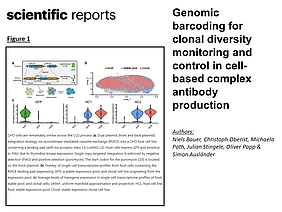New publication by the Stingele lab on genomic barcoding for clonal diversity monitoring and control in cell-based complex antibody production
Bauer N, Oberist C, Poth M, Stingele J, Popp O, Ausländer S (2024) Genomic barcoding for clonal diversity monitoring and control in cell-based complex antibody production. Sci Rep., doi: 10.1038/s41598-024-65323-7 Link
Abstract:
Engineered mammalian cells are key for biotechnology by enabling broad applications ranging from in vitro model systems to therapeutic biofactories. Engineered cell lines exist as a population containing sub-lineages of cell clones that exhibit substantial genetic and phenotypic heterogeneity. There is still a limited understanding of the source of this inter-clonal heterogeneity as well as its implications for biotechnological applications. Here, we developed a genomic barcoding strategy for a targeted integration (TI)-based CHO antibody producer cell line development process. This technology provided novel insights about clone diversity during stable cell line selection on pool level, enabled an imaging-independent monoclonality assessment after single cell cloning, and eventually improved hit-picking of antibody producer clones by monitoring of cellular lineages during the cell line development (CLD) process. Specifically, we observed that CHO producer pools generated by TI of two plasmids at a single genomic site displayed a low diversity (< 0.1% RMCE efficiency), which further depends on the expressed molecules, and underwent rapid population skewing towards dominant clones during routine cultivation. Clonal cell lines from one individual TI event demonstrated a significantly lower variance regarding production-relevant and phenotypic parameters as compared to cell lines from distinct TI events. This implies that the observed cellular diversity lies within pre-existing cell-intrinsic factors and that the majority of clonal variation did not develop during the CLD process, especially during single cell cloning. Using cellular barcodes as a proxy for cellular diversity, we improved our CLD screening workflow and enriched diversity of production-relevant parameters substantially. This work, by enabling clonal diversity monitoring and control, paves the way for an economically valuable and data-driven CLD process.
Read the full paper here: https://www.nature.com/articles/s41598-024-65323-7

